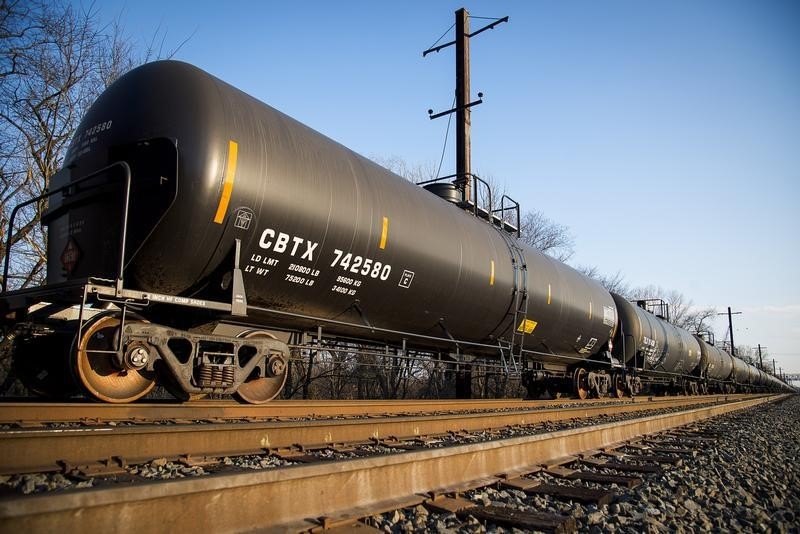2025 Energy outlook: Jefferies lists 10 key questions
Investing.com -- In their ‘2025 Energy outlook’ report issued Thursday, Jefferies analysts highlighted ten critical questions shaping the global energy landscape, driven by policy shifts, market dynamics, and geopolitical factors.
“2024 was a rollercoaster year for energy, with significant dispersion being the group's defining characteristic,” analysts led by Lloyd Byrne said in the note. “We believe 2025 will be similar, with US deregulation and global demand growth being primary drivers of sub-sector performance.”
1) ‘Can the “Trump Trade” Continue?:’ Jefferies notes that investors anticipate benefits for natural gas (natgas) and LNG from "demand pull" under the new administration. "Drill Baby Drill" will likely have limited influence as shale matures and operators focus on returns.
The outlook remains bullish for natgas infrastructure as improved permitting and development could drive growth.
“The deregulatory push is ultimately positive for the fundamentals of North American natural gas, in our view,” analysts noted. “Investors continue to inquire about upstream, services, and midstream options to consider.”
2) ‘North American Natural Gas – Volatility, LNG & Demand Centers:’ LNG demand is expected to tighten gas storage heading into winter 2025-26. Jefferies foresees infrastructure bottlenecks creating price dislocations as demand outpaces supply. Appalachia and Haynesville are positioned to benefit as demand for power and data centers grows.
3) ‘Global Oil Macro (BCBA:BMAm ): Non-OPEC Supply, Politics & Iran vs Demand:’ Jefferies projects non-OPEC+ supply growth in 2025 will match global demand growth.
China and India are forecast to contribute significantly to demand. However, geopolitical risks around Iran could disrupt markets, with potential U.S. sanctions on Iranian exports affecting supply.
“Any decrease in Iranian exports is likely to be compensated by an increase in OPEC+ supply, in part alleviating the spare capacity overhang,” analysts added.
4) ‘US Oil’s Future Role: Shale Maturity or Growth?:’ Oil sentiment is "as negative as ever" based on CFTC positioning.
While oversupply remains a concern, Jefferies sees potential stabilization if Iranian barrels are removed from the market. U.S. production growth is slowing, with the focus shifting to shareholder returns.
5) ‘LNG’s Outlook: Oversupply Thesis Pushed to the Right?:’ According to Jefferies’ report, LNG balances are tightening due to project delays and higher-than-expected demand.
The investment bank highlights the potential for elevated prices, driven by European and Asian gas demand. Post-2025, additional supply from the U.S., Qatar, and Canada could ease the market.
6) ‘Global Refining S&D: What Happened to Higher Mid-Cycle?:’ Jefferies expects global refining supply and demand (S&D) to tighten marginally in the second half of 2025. Capacity closures across Asia Pacific will offset additions, leading to tighter clean product balances.
7) ‘Energy M&A: What Inning Are We In?:’ Consolidation within the E&P sector continues, with room for further activity. Jefferies sees opportunities for midstream and oilfield services to follow suit, driven by capital optimization and mature basin restructuring.
8) ‘Midstream: Still Lots of Interest – Remains a Safe Haven?:’ Midstream remains a defensive play, with strong volume growth from LNG and power demand. Jefferies highlights infrastructure projects in key basins like Permian and Appalachia as drivers for sustained interest in the sector.
“We expect midstream to continue to attract investor attention as way to invest in volume growth while limiting exposure to front month price volatility due to limited North American storage as production continues to rise,” Jefferies analysts emphasized.
9) ‘Shipping: Will the US Enforce Iran Sanctions More Strictly?:’ Jefferies flags the U.S. “shadow fleet” sanctions as a key issue. Tighter enforcement could remove tankers from the market, boosting spot rates and utilization.
“Should the 85 Very Large Crude Carriers (VLCCs) on the watchlist be removed from the market under stricter enforcement, we could see overall tanker utilization jump from 85% to 95%, causing a jump in spot rates for VLCCs and tankers overall,” the report states.
10) ‘International Capex – Will It Meet Expectations?:’ Offshore capex is forecast to rise in 2025, albeit at a slower pace. Investor concerns linger as growth decelerates, but Jefferies expects incremental increases driven by global energy demand.
Source: Investing.com
